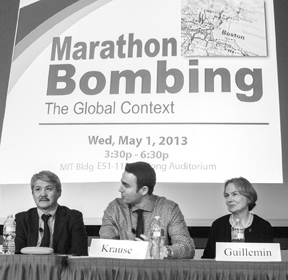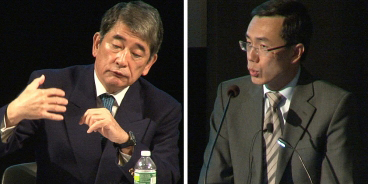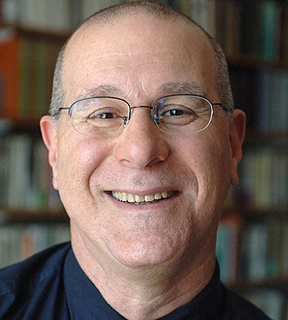The Bombing Heard Round the World?
By Joe McGonegal, MIT Alumni Association

Bakyt Beshimov, a visiting scholar at CIS; Peter Krause, assistant professor of political science at Boston College; and Jeanne Guillemin, senior advisor at the MIT Security Studies Program (l-r) were three of the seven panelists at the Starr Forum.
Photo: John Guillemin
JUST A FEW BLOCKS from where the Boston Marathon bombing suspects allegedly murdered an MIT police officer, a panel of experts convened on May 1 for a conversation entitled "Marathon Bombing: The Global Context."
Who is to blame for the intelligence gap between Russia and the United States before the bombing? Was the bombing an act of religious fundamentalism? Will this event make Boston into a more monitored city, like London, with cameras on every street corner? The panel explored these and other questions on Wednesday.
Moderated by Ford International Professor of Political Science and Center for International Studies director Richard Samuels, five MIT professors and scholars provided several contexts surrounding the bombers' ideology and theorized about the policy impacts the bombing might have in the weeks, months, and years to come.
MIT history professor Elizabeth Wood best summed up the purpose of the Starr Forum talk.
"Unless we understand the perpetrators of violence as individuals situated in history, as individuals situated in causes that are larger than their own biographies, we cannot understand what happened last week at the Boston Marathon," Wood said.
How much did being natives of the Caucasus region influence the Tsarnaev brothers? Wood and Carol Saivetz, a research affiliate at the MIT Security Studies Program, explored this question, describing the past century of Chechnya's tensions with Russia, highlighting how the Tsarnaev family lived through each turbulent decade.
Wood's slide, "Tsarnaev Chronology: A Tale of Two Brothers," detailed the family's moves throughout the region since 1944, when Stalin deported thousands of Chechens to work camps. The family's move to Dhagestan in 2001, when the boys were eight and fifteen years old, was a result of the violence in the second Chechen War, Wood said.
Bakyt Beshimov, a visiting scholar at CIS and a native of the Caucasus region, certainly links the Tsarnaevs' mindset to their homeland.
Beshimov watched every video, read every internet post, and listened to every song that inspired Tamerlan Tsarnaev. "His inner search was, in my view, affected by the struggle in his own country, jihadism in the Caucasus and the global Islamic radical ideology," said Beshimov. "This mindset puts many Chechens into a vicious circle of revenge."
Several panelists conjectured that the bombing might justify crackdowns and human rights abuses in Russia, particularly ahead of the Winter Olympics in Sochi next year. Then there were the questions of what precedents the Boston response will set in cities around the globe.
Bakyt Beshimov, a visiting scholar at the Security Studies Program and a native of the Caucasus region, certainly links the Tsarnaevs' mindset to their homeland.
CIS research associate and assistant professor at Boston College Peter Krause PhD '11 mused, "Is a lockdown something we're prepared to do again and again? What about domestic drones for national security or the government reading our email?"
"I'm not going to counsel one way or another on the [issue of] over- or under-reaction," Krause said. "I'm confident about this: that understanding when and why these things happen is going to lead to better answers as a society…and I'm encouraged by the people who are here today."
Reprinted with permission of MIT Alumni Association.
China and Japan Remain Miles Apart on Uninhabited Isles
At MIT event, diplomats and scholars reinforce high stakes, lack of progress on Asian territorial dispute.
By Peter Dizikes, MIT News Office
THE TENSE, UNUSUAL STANDOFF between China and Japan over uninhabited islands in the East China Sea, and the lack of an obvious resolution to the situation, were apparent during a panel discussion at MIT on Friday, as a Chinese diplomat and a former Japanese diplomat held firm to their countries’ positions, while adding that they hope to end the dispute.
The question of who should possess the five tiny islands—the Diaoyu Islands, in Chinese, or the Senkaku Islands, in Japanese—is a long-running one. But it has flared up again recently, starting in September, when Japan bought three of the islands from a private owner, apparently to prevent them from being purchased by the nationalist former mayor of Tokyo. China has contested Japan's actions, claiming its own historical right to the property; the two countries have since been engaged in a tense standoff marked by military patrols at sea, as well as public demonstrations at home.
The "Diaoyu Islands belong to China and I think there is ample evidence of that," said Liu Weimin, minister counselor at the Chinese embassy in Washington, adding, "China did not start [the] crisis."

Yukio Okamoto, left, is a Robert E. Wilhelm Fellow at CIS and a former special advisor to the prime minister of Japan. Liu Weimin is minister counselor at the Chinese embassy in Washington, D.C.
Photos: Academic Media Production Services
Liu emphasized that "China is committed to peaceful dialogue," and noted that "nobody wants a military conflict in this area." The dispute, he said, was "not the full picture of Sino-Japanese relations." Nonetheless, he added, "Japan should refrain from taking provocative actions."
Representing the Japanese point of view, Yukio Okamoto, a former high-level diplomat and political advisor, politely but firmly differed.
"I agree with most of [what] he said, except the core issue, of the islands belonging to China," said Okamoto, who served in Japan's Ministry of Foreign Affairs from 1968 to 1991, and is spending the current academic year as a Robert E. Wilhelm Fellow at MIT's Center for International Studies (CIS).
"We don't want any military conflict," Okamoto said, but added, "Whenever we talk with China … the talks are always a zero-sum game."
Concern, but no resolution in sight
The event, "On the Rocks: China and Japan in the East China Sea," was part of the Starr Forum series held by CIS, and took place in front of an audience of more than 200 in MIT's Bartos Theater.
The naval patrols that both countries are engaged in were the subject of considerable discussion by the panelists, who emphasized the disastrous effects that any military action, even if triggered by a misunderstanding, could have.
"The current standoff in the islands is inherently dangerous," said M. Taylor Fravel, an associate professor of political science at MIT and an expert on China's territorial disputes in recent decades. He added: "The probability of some sort of incident occurring is growing and growing."
Of China-Japan relations, Fravel said, "They're probably the worst they've been in a decade."
But why exactly do China and Japan care so much about the islands in the first place? Some observers have speculated that material matters, such as nearby natural resources, may be helping to drive the conflict. In that vein, Richard Samuels, the Ford International Professor of Political Science at MIT and director of CIS, quoted Alexis Dudden, a historian of Japan at the University of Connecticut who has noted that, "In world politics, islands everywhere increasingly contain the oceans that surround them, rather than the reverse."
Samuels also noted that domestic political dynamics could be driving the standoff, adding, "There is concern in Japan that the Chinese Communist Party is not in full control of the People's Liberation Army, and there is concern in China that Tokyo now has tilted very hard in the direction of nationalist excess."
Mike Mochizuki, an associate professor of political science and international affairs at George Washington University, acknowledged that this may be a factor, but added that "nationalism itself cannot explain" the dispute, which he called "multicausal" in nature.
Resolution of the standoff may well require outside intervention, although the path to that remains unclear. Okamoto suggested that Japan could refer the matter to the International Court of Justice (ICJ) in The Hague, but pointedly noted that China does not belong to the ICJ.
U.S. diplomats have been engaged with the issue, and Samuels suggested that one path forward would lead through Washington.
"Both countries are watching carefully to see if the United States can prevent a fight between China and Japan, and each is eager to know, if a fight breaks out, whether the United States will be willing and able to stop it," he said. "So there's a lot at stake for all the parties in this dispute."
Still, there was one thing everyone agreed upon. For the moment, "Both sides don't have a perfect solution," Liu acknowledged.
Reprinted with permission of MIT News.
Sharon Stanton Russell, 68, Pioneering Academic

Sharon Stanton Russell
Photo: Rob Russell
Sharon Stanton Russell, 68, died peacefully on February 27, 2013, after a prolonged illness. A prominent and pioneering academic in the field of international migration who advised governments around the world, she was a senior research scholar at the Center for International Studies at MIT.
Russell also served as director of the Mellon-MIT Inter-University Program on Non-Governmental Organizations and Forced Migration from 1997 to 2005 and chair of the Steering Group of the Inter-University Committee on International Migration (IUCM) from 1999 to 2005. Her research and publications focused on global migration trends and policies, the relationship of migration to development, and forced migration. Her publications include "International Migration: Global Trends and National Responses;" "Migration Patterns of US Foreign Policy Interest;" "Migrant Remittances and Development;" International Migration and International Trade; International Migration and Development in Sub-Saharan Africa, and Demography and National Security, co-edited with the late Myron Weiner. Russell had been a member of two United Nations Expert Groups on international migration and had consulted extensively on migration policy issues with private foundations and UN organizations. She was a member of the Centre Advisory & Review Group (CARG) of the Development Research Centre on Migration, Globalization and Poverty, University of Sussex. She served on the Expert Panel on Global Population Projections (1998-2000) and the Roundtable on the Demography of Forced Migration (1999-2004), both convened by the Committee on Population of the US National Academy of Sciences.
Her early engagement in political causes led to a lifetime of strong advocacy for progressive policies. Her dedication to the advancement of opportunities for women and her belief in sisterhood were evident in her devotion to friendships, and her boundless enthusiasm for mentoring many young women whom she nurtured professionally. The importance of family and community was a value that Sharon held deeply. A loving wife, mother and grandmother, she possessed an inspiring generosity of spirit, always seeking to forge connections and embrace friends both new and old.
"Without Sharon's constantly reaching out and advising on research, many people within the IUCIM context and outside - academics and practitioners alike - including myself would not have felt as welcome and supported in the migration, refugee and human rights research work at MIT and in the greater Boston area," said Luise Druke, currently a fellow at the Harvard Humanitarian Initiative and a former human rights fellow at CIS.
Sizing Up Japan, After the Disaster
MIT political scientist examines Japanese stasis after nuclear meltdown at Fukushima.
By Peter Dizikes, MIT News Office

Richard Samuels
Photo: Donna Coveney
AROUND THE WORLD, people watched in horror as an earthquake and tsunami struck Japan on March 11, 2011, soon followed by the slow-motion meltdown of a nuclear reactor in Fukushima. In the days and weeks that followed, many observers expected to see a wave of political or social change sweep Japan as well.
"At that moment, it looked like everything was up for grabs," says Richard Samuels, a professor in MIT's Department of Political Science. "The Japanese themselves defined the moment that way. There was a paroxysm of claims that everything would change."
Instead, as Samuels reflects, there was "nothing on the scale that most of us expected." After a hiatus, several of Japan's nuclear power plants came back on line, and more are likely to do so before long. Long-standing limitations on the role of the military, lauded for its relief efforts, were not lifted. Much-discussed changes in government structures did not come to pass.
Precisely how this turning point failed to turn is the subject of a new book by Samuels, the first full-length scholarly analysis of Japanese politics since the devastating events of 2011. The book, titled "3.11," after the initial date of the event, is being published this month by Cornell University Press.
And while it is focused on Japan, Samuels' book may have an important lesson for observers of other countries at a time when states around the world seem beset by political, military and economic crises: Even during great upheaval, entrenched interests are hard to dislodge.
"Political entrepreneurs come into crises with preferences that don't change as a result of a crisis," says Samuels, the Ford International Professor of Political Science and director of MIT's Center for International Studies. Consider that in all of Japan, he adds, "There was only one political leader in the entire drama who changed his view about an important policy issue, and that was the prime minister, Naoto Kan, who became anti-nuclear.
Three issues: energy, security and government
Samuels' book is a detailed study of Japanese policy debates since 2011 regarding three issues in particular: energy policy, national security and local government. While the salience of energy policy would seem obvious to anyone who followed the aftermath of the earthquake and tsunami, the importance of the other issues might not be immediately apparent to outsiders.
However, Samuels notes, the Japanese military became a major player after 100,000 troops were deployed in the relief effort, probably the most visible military activity Japan has undertaken since World War II.
Meanwhile, the question of local government came to the fore as local officials reacted more quickly and more effectively to the emergency, in some ways, than the central government did. Local officials, through their actions to help those most affected, "created a whole new sense of solidarity," Samuels says.
In all of these areas, Samuels thinks, the politics were contested among three factions: those who wanted to use the disaster as an impetus for significant change, those who wanted to stay the course, and those who wanted to return to policies of the past. But the political lines of division varied in each case: On nuclear power, left-leaning activists wanted change in the direction of renewables, while the faction wanting military changes was further to the right, and wanted greater muscularity.
By itself, "Going forward or staying the course is not necessarily a left or right position," Samuels says.
When it came to nuclear energy, for instance, Japan's anti-nuclear activists, who had been "quiescent," saw the problems at Fukushima as an obvious reason to end the country's dependence on nuclear power. But a better-established group of people wanted to stay the course—including the influential nuclear-energy industry, which warned of potential economic and environmental problems if the nuclear plants remained offline (as they did for several months in 2011).
"The advocates of nuclear power went into hyper-drive and said this is not a sustainable path," Samuels recounts. Massive anti-nuclear popular protests failed to gain long-term traction, and public confidence in the government's ability to find a new energy solution dwindled. Kan, who decided to oppose the continued use of nuclear power, resigned in August 2011.
Before long, Samuels observes, "It was back to the pre-3/11 system."
Crises as tools
Similar inertia took hold in the military sphere, where Japan's postwar policies have long been circumscribed by Article 9 of its postwar constitution, which limits the activity of the armed forces.
"The military acquitted itself very well," Samuels says. "The legitimacy of the postwar military was hard-won, and by the end of this ordeal, it was more widely embraced than ever." But that did not allow for the minority of Japanese who wished for a bigger military to enact any changes.
Samuels' book has been well-received among Japan scholars so far; David Leheny of Princeton University says it "will likely be viewed as the essential work on post-disaster Japanese politics." Disaster expert Charles Perrow of Yale University calls it "a much-needed and careful analysis."
Samuels is willing to acknowledge surprise, on his part, in how few lasting policy changes the tumultuous events have produced so far.
"When we talk about crises, they are instruments, or tools," Samuels reflects. "They're not independently transformative. They're tools in the service of people with preferences, and those preferences are remarkably sticky."
Reprinted with permission of MIT News.



